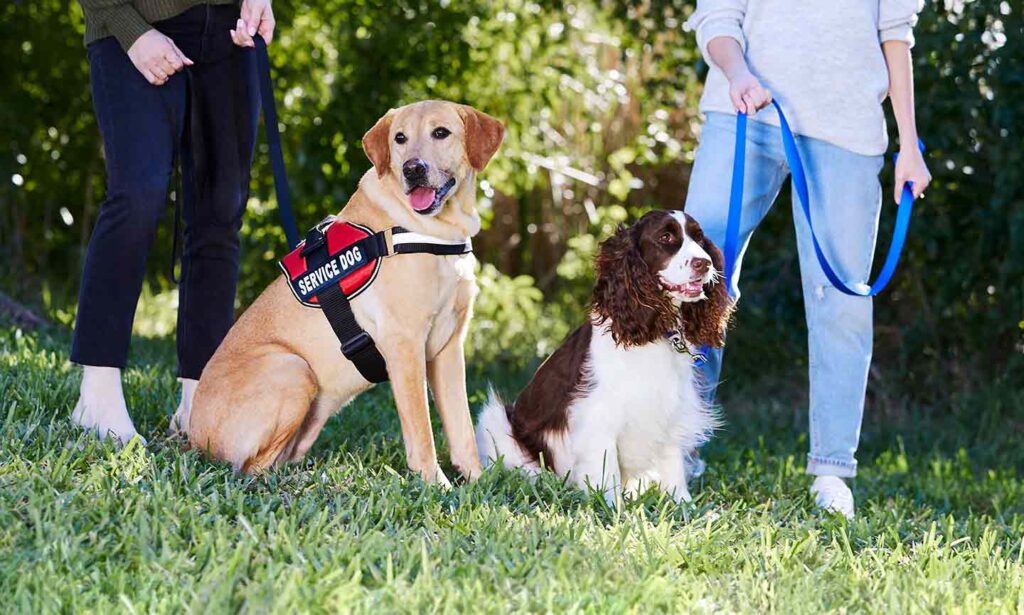Service Dogs Vs. Emotional Support Dogs: What’s the Difference?

Photo by Chewy Studios
Confused about the difference between service dogs vs. emotional support dogs? You’re certainly not the only one. While both types of dogs help people with disabilities, the two groups have clear distinctions with different rights under the law.
So let’s clear up some of the confusion about the difference between service dogs and emotional support dogs, from what qualifies a dog for each title to the laws that govern them, travel restrictions and allowances, training requirements and registration.
Service Dogs
“A service animal means any dog trained to do work or perform tasks for the benefit of an individual with a disability, including a physical, sensory, psychiatric, intellectual or other mental disability.” – Bradley Phifer, executive director of the Certification Council for Professional Dog Trainers
All service animals are covered under the Americans with Disabilities Act (ADA) and are awarded a specific set of rights.
To be considered a service animal under the ADA, an animal must be either a dog or a horse. This is one big distinction between service animals and emotional support animals: While only those two species can be service animals, emotional support animals can be any type of animal.
A service animal must do one or more specific job for their handler, aka the person with a disability whom they assist. Examples include:
- Guiding people who are blind
- Alerting people who are deaf
- Pulling a wheelchair
- Alerting and protecting a person who is having a seizure
- Reminding a person with mental illness to take prescribed medications
- Calming a person with Post Traumatic Stress Disorder (PTSD) during an anxiety attack
These are just a few examples, not an exhaustive list. In general, if a dog performs any specific action that assists a person with their disability, they can be considered a service animal.
Service Dog Rights
So, what rights do service dogs have under the law? The most notable right is that no service dog can be denied entry into public spaces—including buses, airports, planes and workspaces—even if the establishment has a “no pets allowed” policy. (Service animals in training are often awarded the same rights, though each state has its own set of allowances.)
Service animals are also allowed to stay in your residence regardless of your landlord’s or building’s pet policies. In addition, housing providers may not charge any pet fees or deposits for service dogs.
In addition, people and businesses cannot ask what your disability is, require medical documentation, training documentation, or ask that the dog demonstrate their abilities. The only exception is in the case of flying on airplanes, which is part of new rules by the Department of Transportation (DOT). (More on that later.)
Service Dog Training
Though it’s not mandatory, Phifer says that service dogs typically undergo rigorous training that can take years to complete. This training varies depending on the type of service dog, since each type assists their handler in specific ways. Some of the common types of service dogs include:
| Guide Dogs or “Seeing Eye Dogs” | This dog helps the visually impaired. |
| Hearing or Signal Dogs | These service dogs assist hearing impaired people. |
| Psychiatric Service Dogs | They’re trained to help people with psychiatric needs, such as PTSD. |
| Sensory Signal Dogs (SSigDOG) | They assist people with autism. |
| Seizure Alert or Response Dogs | These dogs help people with seizure disorders. |
According to the ADA, people with disabilities have the right to train any breed of dog themselves, though many service animals are graduates of a professional training program.
Service Dog Registration
Registration is not required for service animals under the ADA. In fact, there is no “official” service animal registry, and registration granted through private companies does not convey any additional rights. In fact, neither the ADA nor the Department of Justice recognizes registration as proof that a dog is a service animal.
However, some people choose to register their service dogs in order to get official-looking paperwork that says their dog is a service animal. This documentation can sometimes help prevent unnecessary confrontations or potential discrimination if a person’s disability is unlawfully disputed.
Regardless of registration, all service dogs must follow the same local licensing and vaccination rules that apply to other dogs in their area.
Emotional Support Animals
According to the U.S. Department of Housing and Urban Development (HUD), Emotional Support Animals (ESAs) are a type of assistance animal that provides emotional support alleviating one or more symptoms of a person’s disability. “Emotional support animals might provide companionship, relieve loneliness, or help with depression and anxiety. However, they do not typically have special training to perform tasks that assist people with disabilities.” – Bradley Phifer, executive director of the Certification Council for Professional Dog Trainers
Also, unlike service animals, which must be either dogs or horses, emotional support animals can be any species.
Emotional Support Animal Rights
When it comes to rights under the law, ESAs are quite different from service animals. For example, ESAs are not guaranteed acceptance in all public places like service dogs are. If a business has a “no pets” policy, for example, they are within their rights to turn your emotional service dog away, too.
However, ESAs do have some important protections and rights, especially when it comes to housing. According to the Fair Housing Act, which prohibits housing discrimination against people with disabilities, “no pet” rules and pet deposits must be waived for ESAs. Additionally, because these animals are not considered pets under the law, they cannot be counted toward any pet limit imposed by a landlord, condo board or homeowners’ association.
As with service animals, a housing provider can’t ask about the nature or extent of your disability. However, they may request documentation, such as a letter from your mental health professional, to confirm that the accommodations you’re seeking are due to a disability.
Emotional Support Animal Training
Unlike service dogs, ESAs do not typically undergo emotional support animal training. While you can certainly enroll your emotional support dog in training classes and get them certified in specific areas, it’s not expected. More than anything, your ESA is a companion animal who provides comfort in your day-to-day life simply by being a calming presence, rather than performing tasks.
Emotional Support Animal Registration
Just like service dogs, there is no official registry for emotional support animals. Though some ESA handlers choose to purchase a registration through a private company to get official-looking paperwork, these documents guarantee no additional rights under U.S. law. It is not necessary to pay any fee for registration or certification.
There is one piece of documentation you may need in order to access the rights afforded to emotional support animals, however: a letter from a mental health professional that confirms you have a disability that would benefit from an emotional support animal. Some housing providers require this before waiving pet rules or fees.
Similarities and Differences
- Service dogs and emotional support animals (ESAs) have different rights under the law.
- Service dogs perform specific tasks to assist people with disabilities. ESAs provide comfort to people with disabilities mainly through their calming presence.
- By law, service dogs must be allowed in public places. Public establishments have the right to deny entry to ESAs.
- In light of new travel rules, most airlines offer special accommodations to trained service dogs only. ESAs and service dogs in training must adhere to an airline’s general pet policy.
| Service Animals | Emotional Support Animals | |
|---|---|---|
| What They Do | Perform specific tasks, such as retrieving items or opening doors, to assist a person with a disability | Provide emotional comfort to a person with a disability, generally through their presence and companionship |
| Species | Dog or horse | Any species of animal |
| Training | Typically trained to perform specific tasks | No specialized training necessary |
| Registration | Not required under federal law | Not required under federal law |
Traveling With Service Dogs and ESAs
Under new Department of Transportation (DOT) rules, both emotional support and psychiatric service animals (who perform tasks for people with PTSD and other psychiatric disabilities) may need to submit very specific supporting documentation 48 hours before their flight. In some cases, airlines may not offer special accommodations for emotional service dogs at all, requiring them to travel under their general rules for pets instead.
Further, all ESA and service dog handlers may need to answer questions from airline personnel, particularly in cases where a disability isn’t deemed “obvious.”
Some of those questions might include:
- What tasks or functions does your animal perform for you?
- What has the animal been trained to do for you?
- Would you describe how the animal performs this task or function for you?
Though airlines may default to the DOT’s new rules, you may find that individual pet policies vary slightly from carrier to carrier. It’s important to check each airline’s rules and regulations before booking your flight.
| Airline | Service Dog/ESA Policy |
|---|---|
| American Airlines | Leashed service dogs 4 months and older are welcome. DOT documentation is required at least 48 hours in advance. See the airline’s service animal policy. ESAs and service animals in training must adhere to the airline’s general pet policy. |
| Alaska Airlines | Service dogs are welcome. DOT documentation is required at least 48 hours in advance. See the airline’s service animal policy. ESAs and service animals in training must adhere to the airline’s general pet policy. |
| Delta Airlines | Service dogs are welcome. DOT documentation is required at least 48 hours in advance. See the airline’s service animal policy. ESAs and service animals in training must adhere to the airline’s general pet policy. |
| Frontier Airlines | Leashed service dogs ages 4 months and older are welcome. DOT documentation is required at least 48 hours in advance. See the airline’s service animal policy. ESAs and service animals in training must adhere to the airline’s general pet policy. |
| JetBlue | Leashed service dogs are welcome. DOT documentation is required at least 48 hours in advance. See the airline’s service animal policy. ESAs and service animals in training must adhere to the airline’s general pet policy. |
| Southwest Airlines | Leashed service animals are welcome. DOT documentation is required at least 48 hours in advance. See the airline’s service animal policy. ESAs and service animals in training must adhere to the airline’s general pet policy. |
| United Airlines | Leashed service dogs 4 months or older are welcome. DOT documentation is required at least 48 hours in advance. See the airline’s service animal policy. ESAs and service animals in training must adhere to the airline’s general pet policy. |
FAQs
Are service dogs the same as emotional support dogs?
No, service dogs and emotional support dogs aren’t the same. While both types of dogs help people with disabilities, each is a unique classification governed by different laws. Service animals are trained to perform specific tasks that assist a person with a disability, while emotional support dogs provide emotional comfort but are not required to perform specific tasks.
Can a service dog be for emotional support?
Absolutely, service dogs can provide emotional support. In fact, many service dog owners feel deeply emotionally connected to their pet. However, in order to qualify as a service animal, a dog must perform specific tasks to help a person with a disability.
Is a PTSD dog a service dog or emotional support dog?
A Post Traumatic Stress Disorder (PTSD) dog is a psychiatric service dog who is specifically trained to perform tasks associated with psychiatric disabilities. The ADA says these tasks might include safety checks or room searches, turning on lights, and helping calm the handler when they exhibit signs of stress.
Now you have a better idea of the difference between emotional support and service dogs. These well-trained dogs have very important jobs, so if you see one out in public, try not to disturb him or her!




